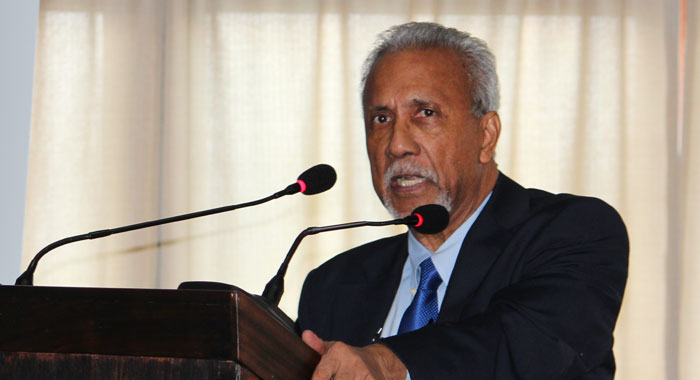By Kenton X. Chance
PLACENCIA, Belize (CMC) — A leading Caribbean academic says that while Venezuela’s PetroCaribe initiative helped participating CARICOM countries get through a difficult patch, it also deterred investments in renewable energy.
In 2005, Caracas developed an oil alliance with many Caribbean states to purchase oil on conditions of preferential payment.
Eight years later, PetroCaribe agreed links with the Bolivarian Alliance for the Americas (ALBA), to go beyond oil and promote economic cooperation
“I think the record is clear: PetroCaribe reduced a lot of its members to debt-laden countries,” Professor Emeritus Anthony Bryan said, adding that by 2015, more than one-third of the external debt of CARICOM members of PetroCaribe was owed to Venezuela.
Bryan told delegates attending the Sixth Caribbean Sustainable Energy Forum (CSEF VI) that in addition, Venezuela’s resource diplomacy had a telling impact on CARICOM regional negotiation and regional cooperation.
“Some got deals, signed agreements which were better than others,” he said as he spoke on the topic “Geopolitics, Climate Change and Energy Governance within the Caribbean”.
The University of the West Indies (UWI) scholar, who is also an independent consultant on energy development, said that then Venezuelan president Hugo Chavez, under whose leadership Caracas launched PetroCaribe, had noted afterwards that “oil is a geopolitical weapon”.
“… at that time, the Venezuelan largess was being distributed throughout the Caribbean and the hemisphere in the name of 21st-century socialism,” Bryan said.
“I had a lot of trouble deciphering what that meant but then I came to the conclusion that it was this curious socio-economic theology located in an expansive void between Simon Bolivar and Santa Clause,” he said to laughter, as he chuckled.
“He was giving away the largess of the country,” Bryan said, adding that history is replete with belligerent leaders using humanitarian rhetoric to hide geopolitical designs.
Bryan, however, said the PetroCaribe experience is a forceful lesson for the CARICOM region.
“And what I think was the worst part of it is that it lured the region into a false sense of energy security. Governments and private sectors should have been looking to advance the cause of renewable energy or, in the case of my country, Trinidad and Tobago, to at least invest in the cause of renewable energy in the future.
“But we didn’t do that. All we did was have a series of mendicant pilgrimages to Caracas. Every country was doing that. Going to meet with Chavez; going to get some honey,” Bryan said, adding that this was no vision for energy security.

He said that the region needs a clear vision for energy cooperation that will integrate energy policy with trade, economic, environmental, security and foreign policy while broadening dialogue with producing and consuming countries alike.
“In all of this, we still have to remember international relations 101: countries do not have friends, they have interest.”
The academic said that the world’s most highly concentrated deposits of oil, natural gas, and coal have helped to determine the global balance of power over the past century, giving a small number of energy-rich states, many of them in the Middle East, tremendous influence.
But Bryan said even renewable energy will change geopolitics.
“The change to renewable energy does not lend itself to the same kinds of international oligarchies. For one thing, renewable energies are practically universal. They are few places in the world that lack wind, sunlight, water, and bioenergy of any kind.
“Plan for generating wind, solar and hydro power — the predominant renewable energy sources — they don’t require fuel, and, by extension, no fuel shipments.
“In addition, renewable energy generation is by its very nature intermittent. The sun shines, the wind blows, the rivers flow regardless of geography, further evening the geopolitical playing field, and, compared with more traditional fuels such as natural gas and coal, renewable energies have a much higher potential for decentralised generation.”
He said that scientists are already suggesting that the global transformation to renewable energy will put electricity centre stage.
“Countries will probably integrate their electricity grids regionally as a result, globalised energy will gradually become more regionally focused or the regional trade will continue.”
Bryan said that while this is being done, the region has to watch for emerging nations, particularly, China.
“It’s the world’s biggest supplier and miner of rare earth materials, the biggest employer or renewable energy capacity worldwide, the biggest market for electric vehicles,” he said, noting that this reality makes Beijing the main provider of energy products, services, technology for much of the world.
“Even so, the United States can preserve its traditional importance in the energy sphere with innovation.
Bryan said the book “Taming the Sun: Innovations to Harness Solar Energy and Power the Planet” suggests that growth of renewable energy will require new changes in financial systems, technology, profoundly change energy products to reduce cost.
“But what about those who will lose? Sad to say, maybe my country, Trinidad, is one of them,” he said, noting however that a country’s status as a solar energy power does not confer the same geopolitical eminence as enjoyed in an oil-dominated world of the past century.
“Oil was a weapon that they would use.”
He said that along with the changes that renewable energy will pose to the geopolitical order, it may well change the face of war, adding that fossil fuels, particularly oil, have set off several conflicts since the second World War.
“Renewable energy, because of its comparative abundance and potential for decentralisation, probably won’t have the same to spark large military confrontation. In fact, it will bring about renewed cooperation among states.”
He said that consuming nations have always felt that the scarcity of oil makes them vulnerable.
But Bryan said the notion of scarcity is coming to an end, that as a result of a number of developments in the energy sector, including the development of shale in the United States, which has turned that country into the biggest combined producer of oil and gas.
The second major change is taking place in China, which is attempting to move from an energy intensive economy to a more service-led one.
“Its over dependence on imported oil forced it to harvest more of its own wind and sunlight and it is the country with the most ambitious plans for renewable energy, and, of course, to create more low-carbon energy systems to fight climate change,” Bryan said, noting that the geopolitics of energy would develop into a contest of which country can produce the most energy of its own.
“Those who don’t embrace clean energy transition would be losers in the future,” Bryan said, adding that with the exceptions of Suriname, where hydro accounts for half of the energy supply, the development of renewable energy in the Guianas and Caribbean islands is still in early phase.
He said this is understandable because the project requires high initial capital, possibly only available through concessional financing or global venture finding as well as a dose of luck in implementation.






